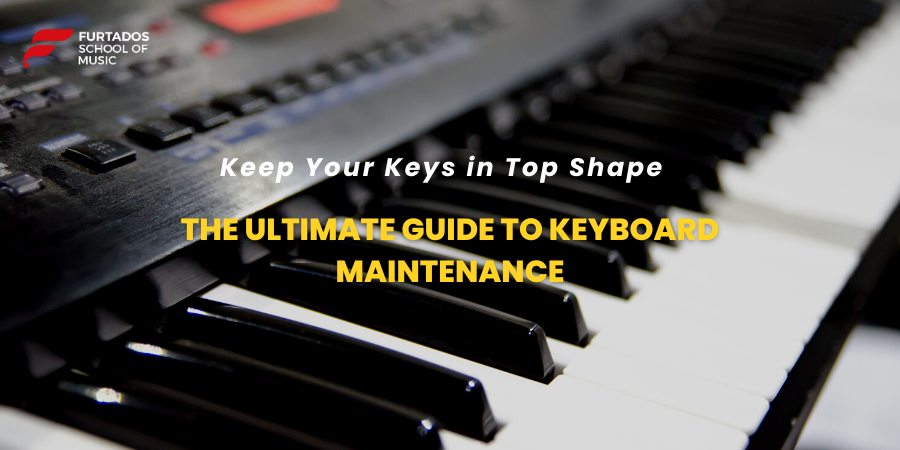As a devoted keyboardist attending Furtados School of Music, you understand the importance of your keyboard as a versatile and expressive musical instrument. Whether you’re playing a digital piano, synthesizer, or MIDI controller, your keyboard is the gateway to creating beautiful melodies and exploring a vast range of musical styles. To ensure that your instrument continues to perform at its best and stands the test of time, proper maintenance is essential. In this comprehensive guide, we will delve deeper into keyboard maintenance and share invaluable tips to help you keep your keys in top shape. Here are some Guide to Keyboard Maintenance.
The Ultimate Guide to Keyboard Maintenance:
- Clean with Care
Keeping your keyboard clean is vital for maintaining its performance and longevity. Dust, dirt, and debris can accumulate on the keys and between the buttons, affecting their responsiveness and overall playability. To clean your keyboard, use a soft, lint-free microfiber cloth to gently wipe down the keys and remove any surface dirt. For hard-to-reach areas, you can use a small, soft brush to dislodge debris. Avoid using abrasive or chemical cleaners, as they can damage the keyboard’s surface and sensitive electronics.
- Protect from Moisture
Moisture is the nemesis of electronic devices, and your keyboard is no exception. Always keep drinks and liquids away from your instrument, and use a keyboard cover when not in use to shield it from accidental spills. If your keyboard does come into contact with liquid, immediately turn it off and unplug it. Allow it to dry completely before using it again to prevent any potential damage to the internal components.
- Use the Right Power Source
Using the correct power adapter and voltage is crucial for the proper functioning of your keyboard. Using the wrong power source can lead to power surges, circuitry issues, and, in some cases, permanent damage. Always refer to the manufacturer’s guidelines and use the recommended power adapter for your specific keyboard model. Avoid using cheap or generic power adapters, as they may not provide a stable power supply, resulting in performance issues.
- Store in a Safe Environment
When not in use, store your keyboard in a dry and dust-free environment. Avoid exposing it to extreme temperatures or direct sunlight, as these can affect its performance and appearance. If you’re not using your keyboard for an extended period, consider covering it with a dust cover to protect it from dust and other environmental factors. Additionally, store it in a location where it won’t be accidentally bumped or knocked over.
- Practice Proper Playing Technique
Your playing technique can significantly impact the wear and tear on your keyboard’s keys and other components. Applying excessive force while playing can strain the keys and lead to premature damage. Be mindful of your playing technique, and avoid hitting the keys too hard. Use the appropriate touch and pressure for different musical styles and passages. With proper playing technique, your keyboard will remain in excellent condition for years to come.
- Schedule Professional Maintenance
While basic cleaning and care can be done by the player, it’s essential to consider scheduling regular maintenance with a qualified keyboard technician. Just like any other mechanical or electronic device, keyboards require periodic inspections and servicing to ensure optimal performance. A professional technician can inspect and clean the internal components of your keyboard, address any potential issues, and ensure that your instrument is functioning at its best. They can also perform actions such as key weighting adjustments and calibration to maintain the keyboard’s responsiveness.
- Invest in a Quality Keyboard Case
If you frequently travel with your keyboard or take it to gigs, investing in a sturdy and padded keyboard case is a wise decision. A quality case will protect your instrument from bumps and scratches during transportation, ensuring it stays in top shape for performance. Additionally, a keyboard case with proper padding can provide extra protection against temperature and humidity changes that may occur during travel.
A well-maintained keyboard is not only a pleasure to play but also an instrument that will serve you faithfully for years to come. By following these detailed keyboard maintenance tips, you can ensure that your instrument remains in top shape, providing you with endless musical possibilities. At Furtados School of Music, we are passionate about music education, and our Online Keyboard Classes and Keyboard Classes near you offer aspiring musicians expert guidance and support to excel in their musical journey. Learn keyboard techniques, explore the world of music, and let your passion for music shine through your well-maintained keyboard!
